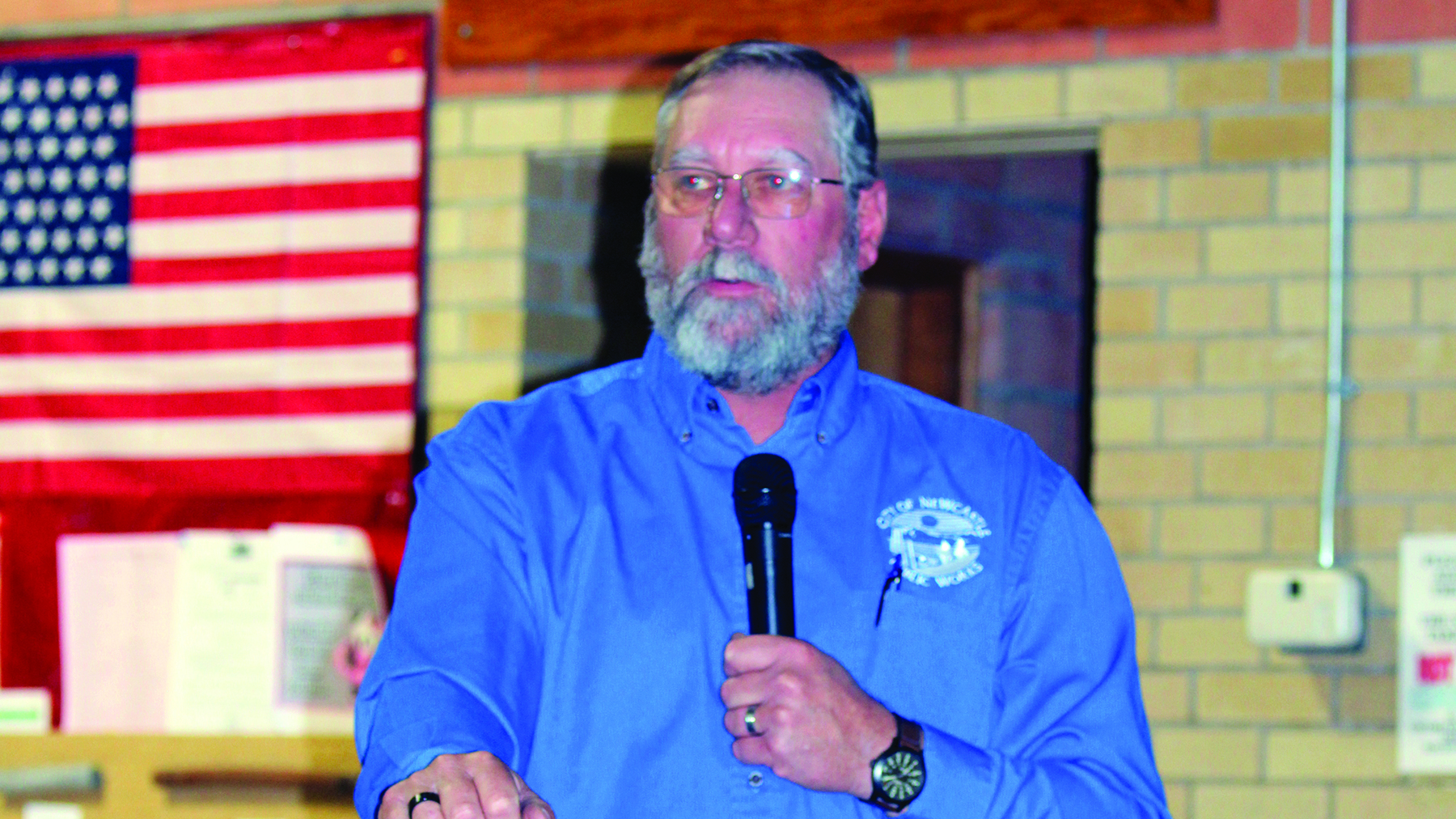Rate review continues, Dozens attend town hall meeting on utilities rates

Photos by Emalee Sweet/NLJ Public Works Supervisor Greg Stumpff explains the reason for the proposed rate changes, based upon a study authorized by the City of Newcastle, in a town hall held at Weston County Senior Services on Tuesday, Sept. 24.
Newcastle officials hosted a town hall on Sept. 24 at the Weston County Senior Center about the water, sewer and garbage rate increases proposed by consultant Carl Brown in a 173-page report.
About 50 people attended this first town hall, and a second will be held at the same location. That meeting will be held at 6 p.m. on Oct. 15, according to Newcastle Clerk-Treasurer Stacy Haggerty.
Public Works Supervisor Greg Stumpff presented the rate analysis plan, which includes all planned improvements and planned replacements for the next 10 years. The city reviewed current operations and maintenance work and respective costs and funding options.
Ultimately, Newcastle’s pipes are aging and must be replaced because they lack structural integrity, Stumpff said.
“We’re at the end of our infrastructure’s useful life,” he said, suggesting the city must plan out as far as possible to address those infrastructure needs and build rates that allow them to pay for those plans. Brown recommended that the city have 25% of its annual operating budget in its reserves, which can be used for emergencies, project overruns, matching funds for grant opportunities and future replacements.
“This rate increase would get us to a point where we have a baseline minimum,” Stumpff said.
He indicated the plan he presented was based on the test year, which was fiscal 2022-23. The city has, in the meantime, raised rates, so part of the hike has already occurred.
For Newcastle’s average customer, who uses 6,713 gallons per month per tap, the total average utility bill (water, sewer and garbage) would rise 18.28%, or $21.76, to $140.85 monthly, Stumpff said. The percentages are based on a start date of Jan. 1, 2025. In every year after this first increase, rates would rise 4%, with a reevaluation every five years.
Several residents said they were concerned about being able to afford the increase because they are on fixed incomes, but the proposed rate increase was actually the cheaper of two scenarios laid out by the consultant There were actually two plans outlined, but Stumpff directed residents to review model 3, not model 4, for each service. The difference between models 3 and 4, according to the report, is that model 4 is more expensive because it assumes a 50% rise in the cost of capital improvements over those currently expected.
Council member Tyrel Owens, who’s the Wyoming state field manager for the Midwest Assistance Program and on the city council’s Water/Sewer/Fire Committee, said that even though he’s not looking forward to a price increase, it’s necessary. Broken water mains have flooded people’s homes. Rotted sewers have backed up into people’s basements. Old clay tile sewers are infiltrated with roots.
“The failing infrastructure that we have in our community right now is a problem, and it has been for a long time,” he said.
He said the council is trying to plan infrastructure replacements that will help residents.
“You’re going to have clean water coming out of the tap,” he said. “Your waste is going to be taken care of.”
Council members will need to choose whether to follow Brown’s recommendations. Stumpff noted that most of the council members were present at the meeting, although some were unable to attend.
“They have heard what you said. They do take it to heart. It is in their hands to make the decision, so that’s why they wanted to hold this, so they could hear what everybody had to say, so everybody had a chance to speak up,” Stumpff said.
Learn more
NLJ has posted a video on its YouTube channel of the town hall and of Public Works Supervisor Greg Stumpff’s Sept. 3 presentation to the City Council. The city has posted the report on its website, at newcastlewyoming.com/public-works. Upon request, the city will provide print copies of the report for $10.95 per copy, Stumpff said. The charge is due to the length of the report.






